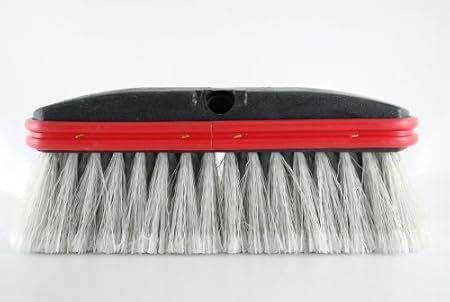Keeping your outdoor spaces clean can be a back-breaking task, especially if you’re dealing with stubborn dirt, grime, mildew, or algae on large patios, decks, or driveways. A good outdoor floor scrub brush can make a world of difference, saving you time and effort while achieving a professional-looking clean. But with so many options available, choosing the right one can feel overwhelming. This guide breaks down the various types of outdoor floor scrub brushes, highlighting their strengths and weaknesses to help you find the perfect tool for your needs.
Types of Outdoor Floor Scrub Brushes
The world of outdoor floor scrub brushes is surprisingly diverse. You’ll find options designed for specific surfaces and cleaning challenges. Here are some of the most common types:
1. Push/Pull Scrub Brushes: The Workhorses
These are the classic, often larger brushes you might picture when you think of scrubbing floors. They typically feature a long handle for comfortable upright cleaning and stiff bristles for tackling tough dirt. Push/pull brushes are excellent for larger areas like patios, driveways, and pool decks. Look for brushes with adjustable handles to customize your reach and reduce back strain. The bristle material is key; nylon is durable and versatile, while polypropylene offers greater stiffness for heavier grime.
2. Rotary Scrub Brushes: Speed and Efficiency

For bigger cleaning jobs or when time is of the essence, a rotary scrub brush is a game-changer. These brushes attach to a power drill or other rotary tool, significantly speeding up the scrubbing process. They’re ideal for large areas and can handle heavy-duty cleaning tasks. However, they require a bit more caution to prevent damage to delicate surfaces. Always test the brush on an inconspicuous area first. Pay attention to the brush head diameter and bristle density; larger heads cover more ground, while denser bristles provide greater cleaning power.
3. Deck Brushes: Designed for Wood
Wooden decks require a gentler touch than concrete or tile. Deck brushes are specifically designed with softer bristles that effectively clean without scratching the wood. They often have a wider head to cover more surface area quickly. Look for brushes with angled bristles to get into grooves and crevices, helping to remove embedded dirt and debris. Natural bristle brushes are a popular choice for their gentle cleaning action, but synthetic options also offer effective cleaning without damaging the wood.
4. Stiff Bristle Brushes: The Heavy-Duty Option

For truly stubborn grime, mildew, or algae, a stiff bristle brush is your best bet. These brushes are typically made with harder materials and are designed to remove even the most tenacious dirt. They are great for cleaning heavily soiled areas like driveways, but should be used cautiously on more delicate surfaces like wood or certain types of stone. Always check the recommended use for the brush to prevent scratches or damage.
5. Soft Bristle Brushes: For Delicate Surfaces
On the opposite end of the spectrum are soft bristle brushes, ideal for cleaning more sensitive surfaces such as painted wood or certain types of stone. These brushes offer gentler cleaning while still removing loose dirt and debris. They are less effective on heavily soiled areas, but perfect for maintaining the cleanliness of surfaces that might be damaged by harsher brushes.
Choosing the Right Brush: Key Considerations
Selecting the ideal outdoor floor scrub brush depends on several factors:
1. Surface Type:
Different surfaces require different cleaning approaches. Hard surfaces like concrete and tile can handle stiffer bristles, while delicate surfaces like wood or painted surfaces need softer bristles.
2. Size of the Area:
For smaller areas, a standard push/pull brush might suffice. Larger areas benefit from the efficiency of a rotary brush.
3. Severity of the Soil:

Stubborn grime and algae demand a stiffer bristle brush, whereas light dirt can be removed with a softer option.
4. Handle Length and Ergonomics:
A comfortable, adjustable handle minimizes strain during prolonged cleaning.
5. Bristle Material:
Nylon and polypropylene are durable, while natural bristles offer a gentler approach.
Maintenance and Care of Your Outdoor Scrub Brush

Proper care extends the lifespan of your scrub brush. After each use, rinse the brush thoroughly with water to remove any dirt and debris. Allow it to air dry completely to prevent mold and mildew growth. Periodically check the bristles for wear and tear, replacing the brush when they become significantly frayed or damaged. Storing the brush in a dry, well-ventilated area helps maintain its integrity.
Investing in the right outdoor floor scrub brush makes maintaining your outdoor spaces significantly easier and more enjoyable. By considering the factors outlined above, you can choose the perfect tool to tackle any cleaning challenge, leaving your patios, decks, and driveways sparkling clean.